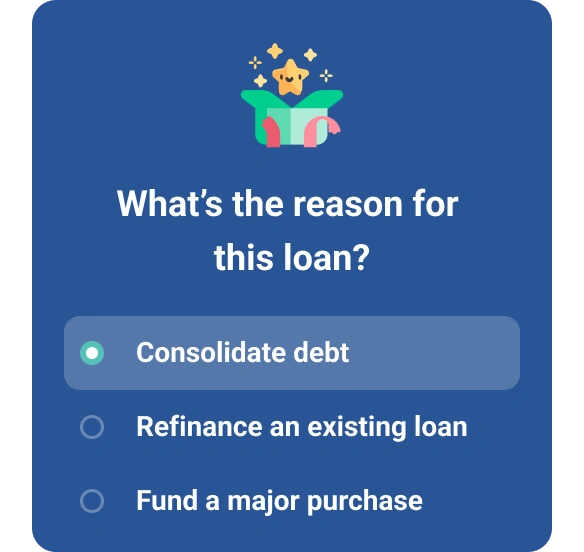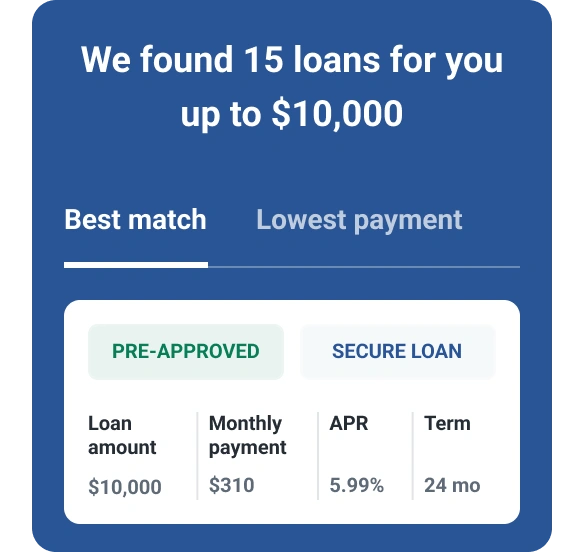Can You Get a Debt Consolidation Loan With Bad Credit?
Quick Answer
It may be difficult to get a debt consolidation loan that will improve your financial position if your FICO Score is less than 580. A higher score will give you better options.

There's not a specific credit score needed to be approved for a debt consolidation loan, though some lenders do have score minimums. It's a good idea to know where you stand, scorewise, before you apply.
Applicants with a FICO® ScoreΘ lower than 580 (labeled as "poor credit") may have trouble getting a debt consolidation loan. Those with higher credit scores have more options for getting approved and may qualify for more favorable terms.
It's important to keep in mind, though, that credit scores are not all lenders consider. They'll also look at things like your income and your existing debt obligations.
Can You Get a Debt Consolidation Loan With Bad Credit?
You don't need stellar credit scores to qualify for a debt consolidation loan. If you are just beginning to rehabilitate a badly damaged credit score, though, you may want to wait a bit.
It is possible to qualify for a debt consolidation loan with bad credit. However, it's important to know the interest rate and loan fees you're likely to get from a lender first. You don't want to exchange the variable rates you are paying on credit cards for a debt consolidation loan with an even higher fixed rate, for example.
If you don't like the terms of debt consolidation loans you can qualify for now, it may make sense to try to improve your credit enough to be offered better terms.
When Is a Debt Consolidation Loan a Good Idea?
Debt consolidation loans can be a good idea when you have high-interest debt—typically credit card debt—and you want to pay it off by taking out a loan at a lower interest rate. Also, if your debts are spread out over multiple credit cards, a debt consolidation loan can give you one payment per month to make rather than several. Paying your debt off this way can:
- Reduce the amount of interest you pay overall.
- Reduce your credit utilization rate, or the amount of available credit in use.
- Potentially improve your credit score by converting the debt from credit card debt to an installment loan.
- Help you budget by giving you a set amount to pay each month.
- Allow you to keep better track of payment due dates, as you'll make one payment on the debt consolidation loan instead of several credit card payments per month.
Loans for debt consolidation are best for borrowers who have solid credit, high-interest debt and a plan for paying back the loan. Borrowers may also qualify for a balance transfer credit card with an introductory 0% interest rate, though, saving on interest over time. It's worth checking before jumping into a loan.
Borrowers whose credit is less than perfect may have a harder decision to make. Ideally, debt consolidation should:
- Reduce your monthly payment amount.
- Lower your interest rate.
- Give you a structured payment plan.
It may not be a good idea if:
- You're paying off high-interest credit card debt with a new loan, but you are relying on credit cards to make ends meet and running up high credit card bills again.
- Even with a lower payment, you're not able to consistently pay on time.
- You have to significantly extend the term of the loan to get payments you can afford.
Even if a debt consolidation loan does not save you money overall, that might be OK. If you need lower monthly payments, want to make only one payment per month and are willing and able to pay over a longer period, it still might be useful.
Another consideration in an environment of rising interest rates is that the interest rates on credit cards are likely to rise, and a debt consolidation loan typically has a fixed rate. This could mean you'll save a bundle in interest increases over the life of the loan when compared with your credit cards.
How to Get a Debt Consolidation Loan
If you have high-interest debt, a debt consolidation loan can save you money, and it may give you some peace of mind by giving you a rate that won't increase.
If you're thinking about it:
- Find out what your FICO® Score is.
- List the debts—typically credit card balances—that you want to pay off with the loan.
- Add up the balances.
- Write down the interest rates that you are currently paying.
- Compare lenders, and check for minimum credit scores and origination or administrative fees.
Do Debt Consolidation Loans Affect Your Credit?
A debt consolidation loan definitely can affect your credit. It's likely to help you improve your credit if you:
- Make every payment on time.
- Keep credit card balances low once you've used the loan to wipe them out.
- Achieve a better credit mix by adding an installment loan to your credit history.
A debt consolidation loan could hurt your credit if you fall behind on payments and the payments are reported as late to the credit bureaus.
An Alternative to Debt Consolidation if Your Credit Score Is Low
If you are feeling overwhelmed with credit card debt, are having difficulty making your monthly payments and can't qualify for a debt consolidation loan that helps your situation, consider reaching out to an accredited credit counselor with a nonprofit credit counseling agency. Depending on your situation, they may recommend a debt management plan (DMP).
To set up a DMP, the credit counselor will negotiate with your credit card issuers to help reduce your interest rate, waive fees and determine a monthly payment amount. The result is a structured plan for payoff. You'll need to pay on time, so a DMP still requires financial discipline.
Be aware, though: The debt management plan will impact your credit score since you'll be required to close the credit card accounts included in the plan (impacting your credit utilization rate). Additionally, debt management plans may impact your creditworthiness, as a note may be added to your credit report that those balances are being managed by a credit counseling company. Creditors can see these notes and may use them as a reason to not extend you any further credit.
Still, working with a credit counselor and possibly getting on a debt management plan can help you get out from under debt before you have to take more drastic measures, such as debt settlement or even bankruptcy.
The Bottom Line
A debt consolidation loan can help you restructure your debt into a single monthly payment, often at a significantly lower interest rate than you are currently paying. You don't have to have a stellar credit score to get approved, but higher credit scores tend to result in lower interest rates.
You can stay on top of your credit—and know where your score falls on the credit score spectrum—before you apply. Checking your credit score for free can help you know how a lender might view your application and help you pinpoint steps to take to improve your chances of getting a loan.
Find out what debts you owe
Your free credit report lists all your debts, such as credit card balances and loans, helping you create a plan to tackle your debt and improve your financial health.
Review your creditAbout the author
Bev O'Shea is a Georgia-based freelance journalist specializing in personal finance and consumer credit. Most recently, she was a staff writer at personal finance website NerdWallet, where she was an authority on credit reports, credit scores and identity theft.
Read more from Bev

